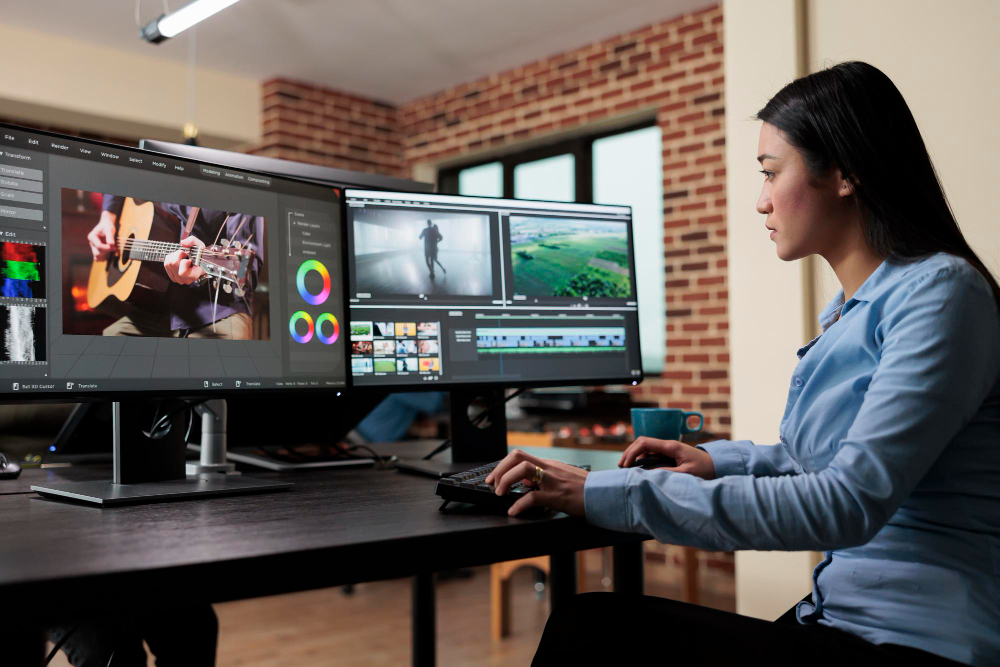AI is speeding up film editing and enhancing creativity. It identifies key moments, suggests cuts, and organizes sequences. Editors can focus on storytelling while AI handles the technical stuff.
AI’s contributions to editing include:
- Key Moment Identification: AI picks out important scenes, reducing the time editors spend searching for highlights.
- Cut Suggestions: It offers cut recommendations, helping editors maintain a smooth narrative flow.
- Sequence Categorization: AI organizes footage into logical sequences, streamlining the assembly process.
- Automation in Assembly: It assembles scenes automatically, freeing up editors to concentrate on creative decisions.
AI’s role doesn’t stop at editing. It’s also enhancing sound design by improving audio quality and reducing noise.
Color correction and grading become more efficient with AI, ensuring visuals are consistent and vibrant. These technologies save time and boost the creative potential of filmmakers, transforming post-production into a more efficient and imaginative process. For those interested in exploring a wide range of AI tools that can further enhance creativity and productivity, our curated directory of AI tools offers a comprehensive selection across various domains, including tools specifically designed for video and sound editing.
AI in Film Marketing
AI is transforming film marketing by providing deep insights into audience preferences. It analyzes data to help filmmakers understand what audiences want, making marketing strategies more effective.
AI tools streamline processes and cut costs by automating tasks like audience analysis and campaign optimization. This reduces the need for extensive personnel and shortens production timelines.
Here’s how AI boosts marketing efficiency:
- Audience Analysis: AI examines viewer data to identify trends, allowing for targeted marketing efforts.
- Personalized Campaigns: It creates tailored marketing strategies that resonate with specific audience segments.
- Cost Reduction: Automation of marketing tasks reduces personnel needs, saving time and resources.
- Engagement Insights: AI tracks engagement metrics, helping refine marketing approaches for better results.
For businesses looking to enhance their digital marketing efforts, the Plug & Play AI Marketing Team offers innovative solutions like campaign automation and AI-driven audience targeting, which are essential for optimizing performance and driving growth.
AI’s ability to process vast amounts of data leads to smarter decision-making, ensuring that marketing campaigns achieve higher success rates. This innovation not only enhances marketing strategies but also aligns them closely with audience interests, driving engagement and maximizing ROI.
Ethical Concerns of AI
AI is pushing boundaries in filmmaking, but it brings ethical concerns. The impact on human creativity is significant. When AI assists in scriptwriting or editing, there’s a risk of losing the unique human touch that defines art. Balancing AI’s efficiency with human creativity is crucial.
Privacy is another concern. AI’s data-driven processes can lead to privacy issues, especially when handling sensitive information or personal data. Filmmakers must ensure they respect privacy while using AI tools.
Intellectual property is also at stake. AI-generated content raises questions about ownership and copyright. Who owns the rights to a script or a scene created by AI? These issues need clear guidelines to protect creators’ rights.
Bias in AI algorithms is a challenge. AI can reflect societal biases if not properly managed. This could affect casting decisions or script developments, impacting diversity and representation in films. For more insights into the challenges of bias and ethical concerns, explore our discussion on the risks and challenges associated with artificial intelligence.
Key ethical concerns include:
- Human Creativity: Balancing AI’s role with preserving artistic integrity.
- Privacy Issues: Handling data responsibly to protect personal information.
- Intellectual Property: Defining ownership of AI-generated content.
- Bias in Algorithms: Ensuring fairness and diversity in AI-driven decisions.
Managing these concerns is vital to ensure AI’s ethical use in filmmaking. This will help maintain the integrity and fairness of the creative process, allowing AI to support rather than hinder artistic expression.
Image : Freepik

Leave a Reply